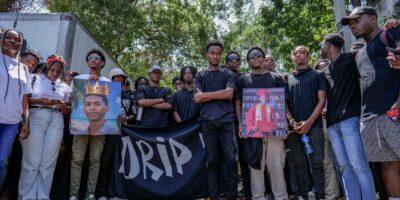Citizens come across lifeless bodies, sometimes mutilated. Others report potential kidnappings without ransom or corpses to AyiboPost
The photojournalist is startled by the “intriguing” corpse the day after the gang attack on the National Penitentiary, just outside the city of Port-au-Prince, in March 2024.
Reporters who came to cover the event and residents of the area rushed to leave the scene when they discovered the body, somewhere on the road, rue Saint Honoré.
The corpse, partially burned, had its chest open and emptied of its internal organs, the professional remembers.
The journalists considered, then dismissed, the hypothesis of damage caused by a stray dog: this dead man had something different from the others.
“There was a certain care in the opening marks on the corpse,” continues the first photojournalist. “We thought it looked a lot like a body that had some organs removed. »
A second photojournalist present that day confirmed the incident to AyiboPost. Residents of the area reportedly noticed the body, visibly fresh, very early in the morning. On either side of his chest, his ribs were carefully spread apart.
This hypothesis remains difficult to verify.
Journalists considered, then dismissed, the hypothesis of damage caused by a stray dog: this dead man had something different from the others.
But two specialists suggest to AyiboPost the existence of criminal organ trafficking networks in Haiti. In addition, dozens of families say they have no news of their missing loved ones without ransom demands or traces of bodies.
According to sociologist Ely Thélot, the crisis situation reinforces the vulnerabilities of the country’s citizens in the face of transnational crimes such as human trafficking, exploitation of all kinds and organ trafficking.
Organ trafficking involves the illegal buying, selling or trading of human organs.
This market, generally present in low-income countries, represents between 840 million and 1.7 billion dollars per year.
Two presidential advisers, Leslie Voltaire and Fritz Alphonse Jean, spoke of the existence of organ trafficking in Haiti, but no solid data exists on the subject.
A report of the Global Initiative against Transnational Crime organized, published in 2024, reveals that certain gangs, notably in Cité Soleil and Canaan, engage in organ trafficking.
Witnesses and hospital sources reported to the organization mutilated bodies found in the streets and in rural areas, as well as the existence of clandestine clinics. Faced with these revelations, the organization is calling for more in-depth investigations.
According to the American organization, Donor Alliance, specialized in organ donation, after removal, a human heart survives between four and six hours, a lung between four and eight hours and a liver, between twelve and 36 hours. The age and health of the person must also be taken into account.
Organ transplantation requires advanced scientific and medical knowledge.
“We must carry out compatibility tests, remove the organ, preserve it and implant it,” medical researcher Jean-Rony Monesteem André underlines to AyiboPost.
These different steps require complex skills and abilities as well as the use of specialized medical devices.
Neighborhoods under the control of armed gangs remain inaccessible to the authorities, so it remains difficult to confirm the existence of these infrastructures. It is unclear whether traffickers from countries close to the region are coming to the rescue to reduce transplant times.
But, continues André, “the return trips of small boats in areas under the control of gangs or the flight in the Haitian sky of small unidentified planes are enough to worry us and should encourage authorities to open investigations.”
These debates on organ trafficking take place in a context marked by increasingly frequent cases of kidnapping, forced disappearances and summary executions in the country. Many bodies were found charred, erasing any possibility of identification.
Read more: Mysterious disappearance and mutilation of corpses in morgues in Haiti
The information sharing platform “Positivis Alerte”, led by entrepreneur Alain Paret, recorded 1,964 disappearances of people between January 2023 and March 2025.
Among them, 108 — including 71 men, 32 women and five minors — were reported directly to the agency by their families.
According to Positivis Alerte, 65 of these people never returned home.
From December 5 to March 14, 2025, the organization recorded sixteen new cases of disappearances, including thirteen in the metropolitan area of Port-au-Prince.
The Haitian state does not keep any count of the missing.
Contacted by AyiboPost, Jean-Wilner Morin, head of the citizen protection office, declares that he is waiting for the publication of a report from the OPC before giving an interview.
AyiboPost has documented half a dozen cases of unfound missing persons in Port-au-Prince between November 2024 and February 2025.
Eder Charles, 37, and his friend Edson Rosier are among the victims. They left their homes in the Poste Marchand district to go to Mosaïque Gardère, a business located on the Route de l’Aéroport in December 2024.
Three months later, the two men have still not returned home.
The two families took multiple steps, but were unable to find the trace of the two friends, testifies Marcus Charles, little brother of Eder Charles.
The monitoring unit of the Combite for Peace and Development (CPD) recorded around twenty disappearances in Port-au-Prince in November 2024.
Faced with the proliferation of these cases, including that of three students from the Lycée de la Saline in April 2024, the organization requested, in January 2025, a visit from the United Nations Working Group on forced or involuntary disappearances in Haiti.
This is not a new phenomenon in the history of the country, Fritznel Pierre, executive director of the CPD, emphasizes to AyiboPost, referring to the disappearances under the Duvalier regime and those of the early 2000s.
But, according to the official, these cases have become more frequent in recent years, in an environment where the silence of families makes documentation work difficult.
Read also: The fascinating secrets of the undertaker’s profession in Haiti
In February 2007, Haiti signed the United Nations Convention on the Protection of All Persons from Enforced Disappearances. But this instrument, supposed to strengthen the legal framework, has not yet been ratified.
In the meantime, families continue to report the disappearance of their loved ones to the press or on social networks.
A 51-year-old man, living in the Bel-air district, told AyiboPost that his only son, who had been out since early January 2025, never returned home even though he went to a supermarket located on Avenue John Brown, Lalue.
The father, who says he was afraid to file a complaint, fearing for his safety, says that residents of the Poste-Marchand neighborhood told him that his son was killed and that they discovered his burnt remains on land near the neighborhood.
“I know I could never bring him back alive, but the corpse would have been enough for me,” says the man in a broken voice, preferring to remain anonymous.
The man’s family had not received any ransom demands.
By : Wethzer Piercin
Cover | A person standing alone in the shadows with their face hidden. Photo : Unknown
► AyiboPost is dedicated to providing accurate information. If you notice any mistake or error, please inform us at the following address : hey@ayibopost.com
Keep in touch with AyiboPost via:
► Our Channel Telegram : Click here
► Our Channel WhatsApp : Click here
► Our Community WhatsApp : Click here







Comments